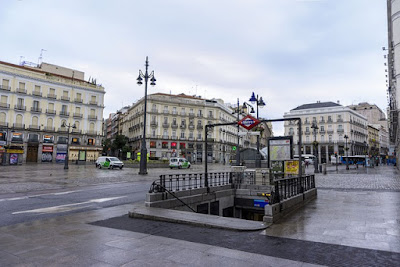Journals and creativity
But, having pondered on finding ways to re-ignite my creative mojo, and feeling a sense of the enormity of the times - the COVID-19 pandemic, the lockdown, the impending economic disaster - I thought I might revisit the idea of keeping a journal. Except this time, I want to make it rather more interesting to write than my early attempts, and, with any luck, I might be able to refer to it in future for writing ideas.
Starting to keep a journal
The first step, this week, then, was to make sure I freed up a specific slot in my day for making journal entries. I chose that quiet time between supper and going to bed, just after I've returned from walking the dog. I figured it's when I would be most relaxed and my mind ready to spill out some thinking. And I decided that if I did not make entries daily, that would not matter. If journaling starts to feel like a burden, it will be dumped as readily as I dump many an attempt at dieting.
The next (and pretty enjoyable) step was to choose from among my many blank notebooks (I am a sucker for buying notebooks. And I'm not a notebook snob - I have plenty of cheap notebooks from places like The Works in UK and Morrison here in Gib gathering dust among a couple of Moleskin). Ditto with the pen. If I was going to release that creative demon, then the weapon had to be just right. And I am also a sucker for buying pens - from felt tips to fountain pens. I settled for an A5 from Morrison in a bright, summery orange and a black biro from The Beacon Press. As cheap as chips. Cheaper, if you try to buy chips at Ocean Village.
And finally, I was ready to write.
But what about? Stumped again, I turned to the internet, and after procrastinating half the afternoon on social media, I googled the word 'journaling'. There is so much out there, the information is bewildering. I sifted through some, avoiding the ones about journaling to improve my life, and journaling being about self care and self discovery, or about stress management or career enhancement, and managed to muster together some ideas.
I guess journaling can be as simple as recording what you've done every day, or things that have impressed you recently, or carved themselves into your mind. You could journal about someone that caught your eye, or a place that left an impression. You can journal about feelings. You can just free write for the day, and that can be quite liberating and lead to some interesting morsels of writing you can use in a more structured piece.
Themes for your journal
I thought I might journal on a theme. I have to be careful though. My intention for writing a journal is to gather some thoughts and ideas, and to free up my writing. That is why I want to journal with a biro. I need the physical act of writing to tap into my creativity. Typing feels too much like being at work to me.
So what theme? Should I write about food, travel, current affairs, health, travel, money, a personal journey into spiritual discovery (no), the weather, the environment, a personal journey from fat and unfit to slimmer, trimmer and fitter (not likely, doomed to failure from the outset!). Should I make it a memoir? Now, that was an interesting thought.
I am not preparing to write a memoir nor an autobiography, but there are many stories stashed away in our memories. Not that we necessarily need to recount them as true to life stories, but sometimes they can inspire interesting pieces of fiction, or poetry. And as those memories are gathered, they become the story of my life, the lives of my children and grandchildren. I wish my mother would write her memories so that they can shed light on my childhood, and I wish my grandparents had the chance to write theirs.
 So I think this might be the path I go down. Let's see how far I get and whether I commit to it for any length of time. In the meantime, I dug out an old story I wrote based on a childhood memory. In '71, my family undertook the tricky journey from Gibraltar to Madrid in the early days of the closed border. Madrid was far different then than it is now, but for a seven-year old from Gibraltar who had never before got off the Rock, it was a vast and wonderful city: department stores, trams, the metro, boating lake, kiosks selling ice cream and 'granizado de limon'. And cows. There was a small byre at the bottom of the road where my aunt lived, with a few cows. I had never before seen a cow (nor smelt one!), nor watched one being milked. And here it was going on in a little backwater in one of the world's capital cities.
So I think this might be the path I go down. Let's see how far I get and whether I commit to it for any length of time. In the meantime, I dug out an old story I wrote based on a childhood memory. In '71, my family undertook the tricky journey from Gibraltar to Madrid in the early days of the closed border. Madrid was far different then than it is now, but for a seven-year old from Gibraltar who had never before got off the Rock, it was a vast and wonderful city: department stores, trams, the metro, boating lake, kiosks selling ice cream and 'granizado de limon'. And cows. There was a small byre at the bottom of the road where my aunt lived, with a few cows. I had never before seen a cow (nor smelt one!), nor watched one being milked. And here it was going on in a little backwater in one of the world's capital cities.The memory was vivid and the story came easily. Maybe with the journaling, others will follow. The story, Spilt Milk, is on the Pages section of this blog, for your enjoyment.























